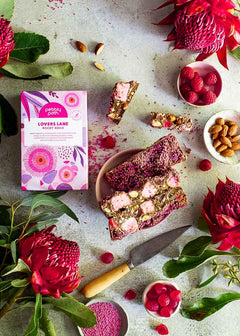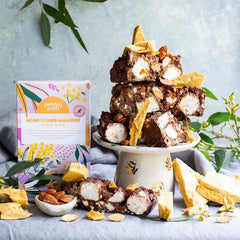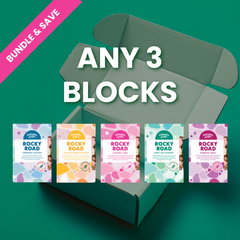Here at Pebbly Path, we are very proud to say that our delicious homemade rocky road is perfectly packaged in 100% biodegradable, home compostable, sustainable, recycled materials. Being environmentally friendly, or eco-conscious, we have spent a lot of time and energy in researching materials for our packaging that is ACTUALLY biodegradable, rather than some of the brands you might know and love, who have been using "greenwashing" techniques since caring about the environment became cool.
So, what is greenwashing? I've taken an excerpt from the Earth Day organisation as they can explain it perfectly:
"Greenwashing happens when products or practices are falsely advertised as environmentally friendly or “green.” Companies may invest money in making themselves seem green without actually making their products more sustainable. When this happens, consumers may think they’re making an environmentally conscious choice when they are, in fact, being deceived.
Concern for the environment is on the rise, and greenwashing allows producers to adapt accordingly without facing setbacks in the market. Consumers are willing to pay more to live a more sustainable lifestyle, which renders them targets for unethical advertising tactics. Companies use deceitful advertising to make their products seem eco-friendly in order to make more money and build up their brand’s public image." (Mary Mabry, 2024).
So, how do we package our award-winning rocky road to ensure it's ACTUALLY biodegradable and eco-friendly?
1. Natureflex cellophane product bags. We buy these from an Australian company Buy Eco Green. Cellophane is derived from wood, cotton or hemp. The bags come from a new range of NatureFlex™ cellophane film which is certified to the European (EN13432) and American (ASTM D6400) norms for industrially biodegradable packaging. In addition, they have been certified by Vincotte to the 'OK to Compost' home standard for home composting. They break down completely, leaving no microplastics.
2. Cardboard product boxes. Firstly, the cardstock is 100% recycled materials - so we're not using virgin paper to make them, no extra trees are cut down, we're reusing the paper that's already in circulation. But secondly, our product boxes are printed with soy-based inks, which means that as they break down, they won't leak harsh chemicals into the soil and water table (like regular petroleum-based inks). We also specifically chose not to put a coating (called lamination) on our boxes. Next time you're wandering around the shops, have a look and feel of the boxes most products come in - they're high gloss (aka plastic laminated), and even many that have a matte look about them have this lamination in a MATTE finish so they LOOK eco-friendly (hello greenwashing). This decision does mean that we can't have that super-luxe gold foiling, or dazzling neon writing to enhance our packaging and catch your eye, but it's a sacrifice we're happy to make.
Other eco-friendly practises in our workplace.
In addition to our 100% biodegradable packaging, we have a zero waste policy at Pebbly Path. No, that doesn't mean we have to eat all the 'imperfect' pieces of rocky road to create a zero waste workplace (although we do eat a lot of it!!!). What it means is that if we do have a rocky road recipe that's not quite right, perhaps it didn't look quite right, or an ingredient was accidentally omitted - we take it up to the Mudgee Pantry, which is a charity organisation that helps to feed people less fortunate than ourselves, by way of heavily discounted or even free groceries. We send up our imperfect rocky road, and they give it out to customers for free.
We are fortunate in Mudgee NSW to have 4 different bins - the normal landfill waste, a cardboard and paper, a glass and plastic, AND an organics collection. This means that any organic waste (including our cellophane bags) avoid going to landfill, and are instead recycled into a useful compost product. We also use compostable sticky tape, compostable baking paper, and of course all food scraps go into this bin to be turned into compost products.
We reuse everything we can, from paper to cardboard boxes to packing filler and everything in between. This allows us to actively participate in a circular economy, and helps to reduce overhead costs, so we don't have to pass those costs on to you as a consumer. That's why sometimes you'll receive a parcel that's got a mixture of packing peanuts and scrunched up paper in it that we use as filler to protect your order, and stockists often receive their large orders in cardboard boxes that have already been through Australia post at least once before!
We use 'Zero Co' cleaning products in the kitchen, and in our BNB too, and love to buy 'Who Gives A Crap' items like toilet paper and tissues - with their super fun vibrant designs to suit our branding as a happy coincidence!
We're not perfect by any means, and there's certainly more that we could all be doing both at work, and at home, but we are trying to do our best, and I know that we're doing something right by the fact that we were finalists in the 2023 Western NSW Business Awards in the category of sustainability (beaten by a team who actually DO the organics composting!!!!) So we're pretty proud of that recognition.
I would love to know if you have any other easy and 'not too expensive' ideas about how we can improve our sustainability, please comment below or drop us a DM or email - I'd love to hear from you.





Leave a comment